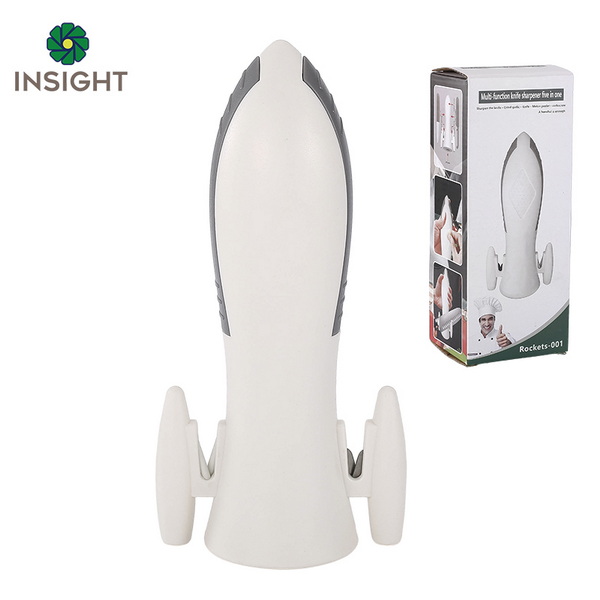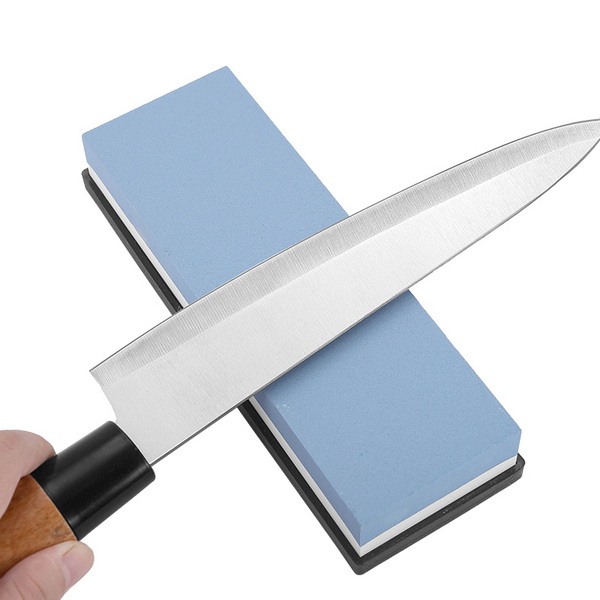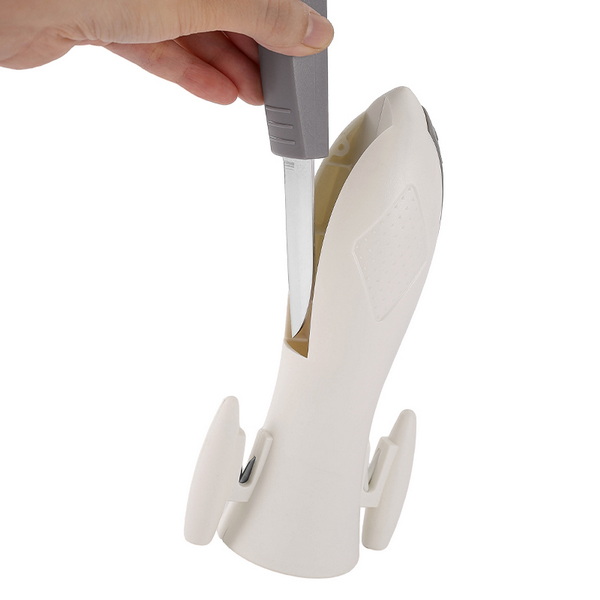

Views: 222 Author: Ella Publish Time: 2025-05-21 Origin: Site








Content Menu
● The Heritage of Knife Sharpening in France
● Leading Knife Sharpener Manufacturers in France
>> Fischer-Bargoin: A Legacy Since 1859
>> Sabatier: The Mark of French Excellence
>> AFLY Affûtage Lyonnais: Precision in Cutting Tools
>> LAM PLAN S.A.S: Polishing and Sharpening Technologies
● Traditional and Modern Knife Sharpening Techniques
>> Traditional Sharpening Steels and Whetstones
>> Mechanical and Electric Sharpeners
● Innovations in French Knife Sharpening Technology
● Environmental and Quality Standards in French Manufacturing
● How to Choose a French Knife Sharpener
● Maintenance Tips for Knife Sharpeners
● The Cultural Impact of French Knife Sharpeners
● FAQ
>> 1. What makes French knife sharpeners unique compared to others?
>> 2. Can I use a French sharpening steel on all types of knives?
>> 3. How often should I sharpen my knives using a French sharpener?
>> 4. Are electric sharpeners made in France suitable for professional use?
>> 5. How do I maintain a whetstone for effective sharpening?
France has a long and rich tradition in cutlery and knife-making, with regions like Thiers recognized worldwide as the historic heart of French cutlery craftsmanship. Among the many facets of this industry, the manufacturing of top-quality knife sharpeners stands out as a critical component, ensuring knives maintain their precision and longevity. This article explores the top knife sharpener manufacturers in France, their craftsmanship, technologies, and how they contribute to the global reputation of French cutlery.

Knife sharpening is an art and science deeply rooted in French culture, especially in regions such as Thiers, which has been a center for cutlery production since the 19th century. French manufacturers combine traditional know-how with modern technology to produce sharpening steels, whetstones, and mechanical sharpeners that meet professional and domestic needs.
Sharpening knives is not merely a maintenance task but a ritual that reflects respect for the blade and the craft of cooking itself. French chefs and home cooks alike understand the importance of a well-maintained edge, which enhances food preparation by ensuring clean cuts and preserving the integrity of ingredients.
Located in Thiers, Fischer-Bargoin is one of the most renowned manufacturers specializing in professional cutlery and sharpening steels. With over 160 years of experience, this family-owned business has modernized its production while preserving ancestral craftsmanship. Fischer-Bargoin produces sharpening steels that are highly regarded among chefs and professionals in the food industry. Their products cover a wide range of applications, from meat processing to bakery and catering industries. The company prides itself on using local craftsmanship and maintaining full control over production, from blade processing to handle injection.
Fischer-Bargoin's sharpening steels are crafted from high-carbon stainless steel, tempered to a hardness level that ensures durability and effectiveness. The handles are ergonomically designed for comfort during prolonged use, often made from durable polymers or traditional materials like wood, reflecting a blend of innovation and heritage.
Sabatier knives are synonymous with French culinary tradition, boasting over 200 years of expertise. Sabatier offers sharpening steels and whetstones entirely made in France, emphasizing professional-grade quality. Their sharpening steels are crafted in Thiers using the best steels, ensuring hardness superior to the knives they maintain. Sabatier provides various handle designs compatible with their knife ranges, catering to both professional and home users. Their sharpening tools are designed to preserve the edge and prolong the life of high-end kitchen knives.
Sabatier's whetstones, available in various grits, allow users to progress from coarse sharpening to fine honing, achieving razor-sharp edges. Their commitment to quality control ensures consistent performance, making their sharpeners a trusted choice worldwide.
Based in Lyon, AFLY specializes in the design, manufacture, and sharpening of cutting tools dedicated to production mechanics. Certified by leading carbide manufacturers, AFLY serves industries such as aeronautics, automotive, medical, and food processing. Their sharpening services include custom tool design and maintenance, offering a comprehensive approach to cutting tool longevity. AFLY's expertise extends to gear cutting tools and specialized industrial blades, highlighting their position as a unique service provider in France.
While AFLY's primary focus is industrial, their precision sharpening techniques influence the quality standards of domestic knife sharpeners, pushing innovation in abrasive materials and sharpening angles.
Founded in 1962 and located in Gaillard, LAM PLAN S.A.S manufactures polishing and sharpening machines used in various high-precision industries, including aeronautics and watchmaking. Their technologies include cutting machines and micromotors designed for polishing and lapping, which are integral to sharpening processes. Although their focus is broader than just knife sharpeners, their innovations contribute significantly to sharpening technology in France.
LAM PLAN's machines are renowned for their precision and ability to produce ultra-fine finishes on cutting edges, which translates into sharper, longer-lasting blades. Their equipment is used by many French cutlery manufacturers to enhance the quality of their sharpening processes.

French sharpening steels, often made in Thiers, are designed to maintain the edge of forged knives. These steels have a hardness greater than the knives they sharpen, allowing for effective honing. Whetstones, soaked in water before use, provide a fine abrasive surface to re-sharpen blades by hand, preserving the blade's integrity and edge precision. The sharpening process involves maintaining a consistent angle, usually between 13° and 20°, depending on the knife type.
The traditional method requires skill and patience, with users drawing the blade along the steel or stone at the correct angle to realign or remove metal from the blade edge. This method is preferred by many professional chefs who value the control and finesse it offers.
France also hosts manufacturers of mechanical sharpening machines that simplify and improve sharpening safety and efficiency. These machines are used by professionals in butchery, fishmongery, and catering. While some manufacturers focus on industrial applications, others provide compact electric sharpeners suitable for household use. These devices often use diamond abrasives, the hardest material available, ensuring durability and precision in sharpening.
Electric sharpeners typically feature multiple stages, starting with coarse grinding to restore the edge, followed by finer honing stages to polish and refine the blade. They are especially popular among users who prefer convenience without sacrificing edge quality.
French manufacturers are at the forefront of integrating new materials and technologies into knife sharpening. For example, diamond-coated sharpening steels and stones offer superior hardness and longevity compared to traditional materials. Additionally, ergonomic handle designs improve user comfort and safety, reducing fatigue during repetitive sharpening tasks.
Some companies have developed hybrid sharpeners combining manual and electric elements, allowing users to benefit from both precision and speed. These innovations reflect the French commitment to blending tradition with modern engineering.
French knife sharpener manufacturers adhere to strict environmental and quality standards. Many factories implement sustainable practices, such as recycling metal scraps and reducing water consumption during whetstone production. The use of locally sourced materials also minimizes the carbon footprint and supports regional economies.
Quality control is rigorous, with each sharpener undergoing multiple inspections to ensure consistency in hardness, balance, and finish. This attention to detail guarantees that French sharpeners meet the expectations of demanding professional users worldwide.
When selecting a knife sharpener, consider the following:
- Type of Knife: Different knives require different sharpening angles and methods. French knives often have specific bevels that need matching sharpening tools.
- Usage: Professional chefs may prefer sharpening steels and whetstones for precise control, while home users might opt for electric sharpeners for convenience.
- Material Quality: Look for sharpeners made with high-grade steel or diamond abrasives for durability and efficiency.
- Manufacturing Origin: French-made sharpeners from regions like Thiers guarantee craftsmanship and quality control.
To maintain your knife sharpener:
- Clean sharpening stones and steels regularly to remove metal particles.
- Avoid using oils or lubricants unless specified by the manufacturer.
- Store whetstones submerged in water or in a dry place as recommended.
- For electric sharpeners, clean the abrasive surfaces and remove metal dust periodically.
Beyond their practical use, French knife sharpeners symbolize the country's dedication to culinary arts and craftsmanship. They are often featured in culinary schools and professional kitchens, where sharpening is taught as a fundamental skill. This cultural significance reinforces the demand for high-quality sharpeners produced in France, supporting artisans and manufacturers committed to excellence.
France stands out as a premier hub for the manufacture of top-quality knife sharpeners, blending centuries-old craftsmanship with modern technology. Manufacturers like Fischer-Bargoin and Sabatier lead the industry by producing sharpening steels and tools that meet the highest professional standards. The rich tradition of knife sharpening in France, especially in Thiers, ensures that both professionals and enthusiasts have access to superior sharpening solutions. Whether through traditional whetstones or advanced mechanical sharpeners, French manufacturers continue to uphold their reputation for excellence in the global cutlery market.
French knife sharpeners are unique due to their combination of traditional craftsmanship from regions like Thiers and the use of high-quality materials such as hardened steel and diamond abrasives. Their manufacturing process often involves meticulous hand-finishing and strict quality control, ensuring superior sharpening performance and durability.
Most French sharpening steels are designed for forged kitchen knives and work best on blades made from softer steel. However, they may not be suitable for ceramic or serrated knives. Always check the compatibility of the sharpener with your knife type before use.
For maintaining sharpness, it is generally recommended to hone your knives with a sharpening steel regularly and perform a full sharpening once or twice a month, depending on usage. Over-sharpening can wear down the blade unnecessarily.
Yes, some French manufacturers produce electric sharpeners designed for professional environments, offering precision and safety features. However, many professionals still prefer manual sharpening steels and whetstones for greater control.
Whetstones should be soaked in water before use and cleaned after each session to remove metal filings. Store them in a dry place to prevent cracking or warping. Flatten the stone periodically to maintain an even surface for consistent sharpening.